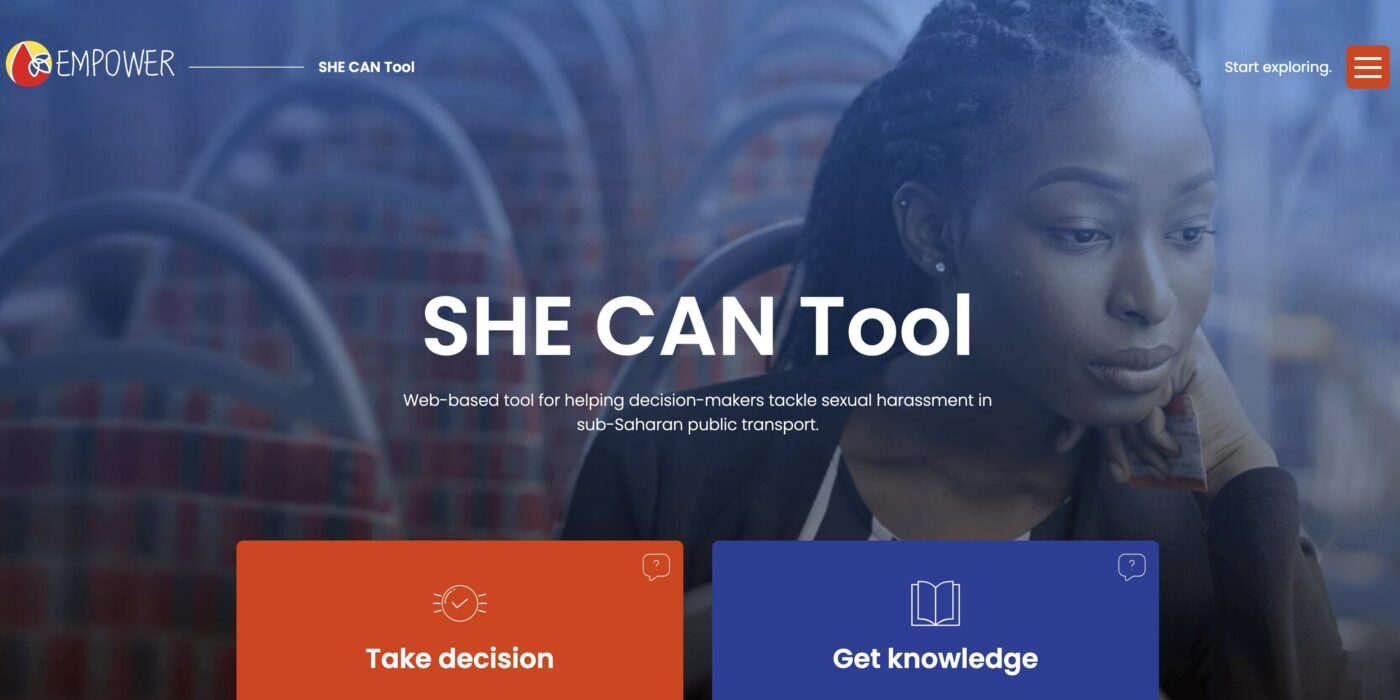
Overview
The SHE CAN tool is a user-friendly, web-based resource, assisting policymakers and transport providers to develop an evidence-based approach to addressing sexual harassment and personal security within public transport. This offers co-benefits to improve female access to education, employment and leisure in Africa, and across the world.
EMPOWER builds the capacity of transport professionals to deliver gender-equitable and inclusive transport to improve the personal security of female passengers. It specifically addresses the causes of sexual harassment towards women when they travel. EMPOWER has delivered an integrated programme of research in sub-Saharan Africa proving the prevalence of the problem, and highlighting that the definition of harassment is not always understood.
The project took place between 2020 and 2022 and collected data on women’s mobility and levels of sexual harassment in two sub-Saharan African cities: Lagos, Nigeria and Blantyre, Malawi. We collected data from urban public transport users and key stakeholders to see the extent to which women’s mobility was affected by fears about their personal security. Our methodology included interception surveys (men and women), focus group discussions and a comparison of paper and tablet collection methods. Over 1000 questionnaire responses were collected in each city over 8 months (from October 2020 to July 2021). This underlined the need for coordinated action by many stakeholders including transport operators, local and regional authorities, ministries, non-government organisations, community groups, police and citizens themselves.
Therefore, the project has developed the SHE CAN Tool:
Sexual Harrassment Engagement
Changing Attitudes Meeting Needs
The SHE CAN tool has been developed based on the findings of the EMPOWER project that investigated sexual harassment on public transport in Africa. This tool has been designed to help cities respond to sexual harassment and makes suggestions to improve the safety and security of urban transport for the benefit of women but ultimately for all citizens.
Publications with the same themes
Publications with the same study countries
Related news & events
Blog
News
Blog
Blog
Blog
PDF content (text-only)
SHE CAN Tool Home Stakeholders Intervention Categories Get Knowledge Advanced Filtering Repository Start exploring. She Can Tool SHE CAN Tool Web-based tool for helping decision-makers tackle sexual harassment in sub-Saharan public transport. Take decision Get knowledge What is the SHE CAN tool? The SHE CAN tool is a user-friendly, web-based resource, assisting policymakers and transport providers to develop an evidence-based approach to addressing sexual harassment and personal security within public transport. This offers co-benefits to improve female access to education, employment and leisure in Africa, and across the world. How to apply the tool? 1. Take Decision This section offers tailored information. You can enter the tool by selecting your stakeholder type. This will help tailor your searches towards interventions within your area of influence. You will then be able to filter by intervention type (e.g. surveillance, legal aspects, campaigns) to obtain detailed information on key interventions. This includes case studies, resources needs, stakeholders involved, risks of implementation, and effectiveness. 2. Get Knowledge Alternatively, the "Get Knowledge" section offers the possibility to explore all the resources available in the tool. Within this section, you will find additional filters that can be applied to further tailor the information to your specific needs. Interventions can be filtered here by their position within the EMPOWER Intervention Classification System (EICS), ease of impact, area of impact, the timeframe of implementation, and their impact on women. Additionally, this section also provides a complex filtering system that allows you to "mix & match" impacts to obtain the best interventions based on your interests. This section also provides valuable information regarding the data collection process for sexual harassment in public transport, alongside downloadable templates and examples. Those interested in reading more about the findings of the EMPOWER project and the current situation regarding sexual harassment in public transport as well as global attempts to tackle it can also access this repository through this section. She Can - woman checking phone on bus Young Women Walking Introduction to the EMPOWER Project EMPOWER builds the capacity of transport professionals to deliver gender-equitable and inclusive transport to improve the personal security of female passengers. It specifically addresses the causes of sexual harassment towards women when they travel. EMPOWER has delivered an integrated programme of research in sub-Saharan Africa proving the prevalence of the problem, and highlighting that the definition of harassment is not always understood. The project took place between 2020 and 2022 and collected data on women's mobility and levels of sexual harassment in two sub-Saharan African cities: Lagos, Nigeria and Blantyre, Malawi. We collected data from urban public transport users and key stakeholders to see the extent to which women's mobility was affected by fears about their personal security. Our methodology included interception surveys (men and women), focus group discussions and a comparison of paper and tablet collection methods. Over 1000 questionnaire responses were collected in each city over 8 months (from October 2020 to July 2021). This underlined the need for coordinated action by many stakeholders including transport operators, local and regional authorities, ministries, non-government organisations, community groups, police and citizens themselves. Therefore, the project has developed the SHE CAN Tool: Sexual Harrassment Engagement Changing Attitudes Meeting Needs The SHE CAN tool has been developed based on the findings of the EMPOWER project that investigated sexual harassment on public transport in Africa. This tool has been designed to help cities respond to sexual harassment and makes suggestions to improve the safety and security of urban transport for the benefit of women but ultimately for all citizens. She Can Tool The project has delivered a coordinated research programme engaging with passengers and stakeholders across Africa to understand the prevalence of harassment in the formal and informal public transport networks. This approach has successfully developed an evidence base that justifies taking action and assists policymakers to develop an improved approach based on the evidence collected. Using the SHE CAN Tool - this process can now be replicated by stakeholders across Africa, to unpack the problem before providing solutions to tackle it. Key findings from the EMPOWER research Studies repeatedly show that sexual harassment on public transport is widespread in both the developed and developing parts of the world and EMPOWER had similar results. Thus, its existence remains undisputed. We also found that the intersections between how women use public space, access urban transport, and connect with economic and social opportunities are interdependent and are difficult to separate. Woman Sitting on Train Street Harassment Statistics In 2015, a large-scale survey of 16,600 female respondents in 42 cities around the world revealed that approximately 84% had experienced street harassment for the first time before they were 17 years old. Women on Public Transport Types of harassment In Kenya, 54% of women interviewed in 2015 said they had experienced some form of gender-based violence while using public transportation. The most common form of violence against women on the popular form of informal public transport in Nairobi, was abusive language (26%), indecent touch (23.3%), and physical harassment (20%). Masked Woman on Public Transit Fear Influences Decisions Women's perceptions of safety while traveling also influences their modal preference. Fear and safety concerns cause women to shift from public transportation to less sustainable, private modes of travel. Often, women make decisions on where they go or which jobs they accept based on feelings of safety. Travel After Dark In Kigali, Rwanda, 55% of women reported that they were concerned about traveling to educational institutions after dark. 'Studies show that girls are willing to go to less-resourced and reputable colleges if they can use a safer route to avoid sexual harassment; they warn that there may be many other girls who decide not to go to college at all due to safety concerns. Young Women Walking on Street Ramifications of Lack of Safety The lack of safety and fear of sexual harassment has repercussions; these extend beyond acts of violence and affect the livelihood, education, and overall socio-economic growth of a considerable demographic in society. The EMPOWER Conclusions The EMPOWER project provided a great opportunity to analyse in detail the issues surrounding sexual harassment in public transport and better understand not only the possible ways to tackle it but the root of it. You can hear the main take-aways from the project as well as an insight into the methodology behind the SHE CAN tool from the EMPOWER consortium members themselves, in the upcoming project video! She Can CTA Background Explore the tool. Take decision Get knowledge Partners & Consortium Vectos European Integrated Projects University of Cape Town Median Toi LAMATA GoAscendal NANA Woman On Bus Smiling Tool developed by EMPOWER Project Logo This research was funded by UKAID through the UK Foreign, Commonwealth & Development Office under the High Volume Transport Applied Research Programme, managed by DT Global UK. Terms and Conditions Privacy Policy Contact Copyright © 2023 Empower Project. All rights reserved.








